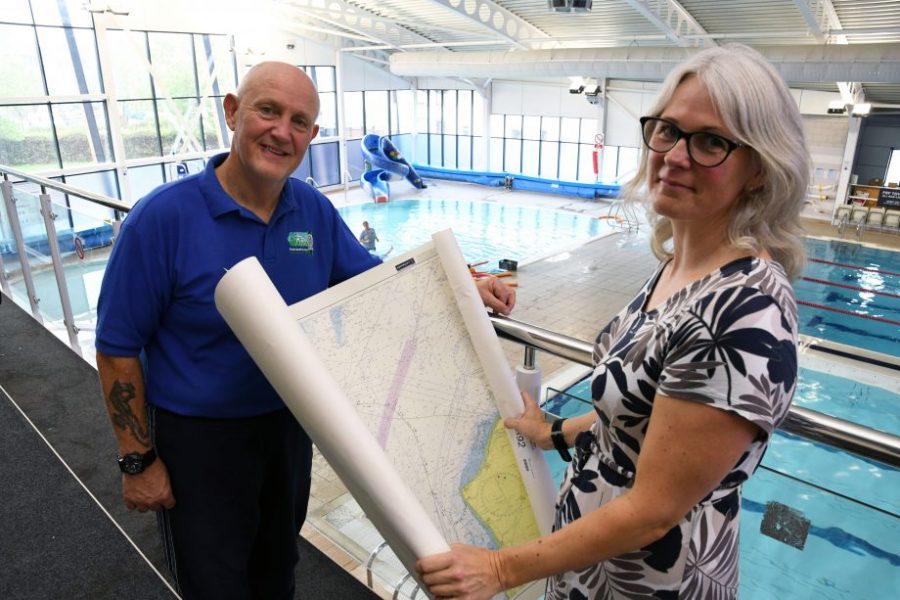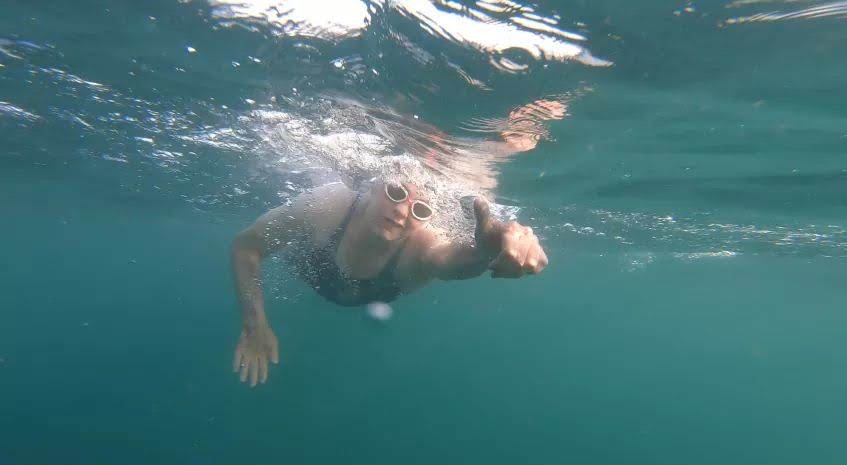News
Housing officer Amanda raises £6,000 in brave Channel swim

A WOMAN’S determination not to let a disability affect how she lives her life has culminated in her swimming the English Channel.
Thanks to 20 gruelling months of training, amazing support from her friends and family – and plenty of bara brith – Amanda Love completed the swim in August, raising more than £6,000 for charity in the process.
It was just five years after she underwent a full discectomy (the removal of a spinal disc) following years of back problems.
“The disc had gone through my spinal cord and wrapped itself around the nerves of my right leg,” said Amanda, a housing officer from Pembrokeshire County Council.
“Gradually it deteriorated to the point where I couldn’t walk as it was too painful.”
The operation to remove the disc took place in early 2014 and two years later Amanda knew she had recovered as much as she was going to. Although her back was much better, the damage to her nerves meant she was left with very little feeling in her right leg and foot and was unable to continue running.
Amanda admits it wasn’t an easy period of her life. “It takes some time to mentally and physically accept and become used to the ‘new normal’,” she said.
But after a discussion with friend, ultra-runner Julie Evans, she decided that her disability did not have to define her have to mean giving up things she loved – and so they entered Ironman Cozumel in Mexico. “I know it sounds mad,” she said. “But it was very important to try and do the things that make me me.”
With her competitive swimming background, she and Julie figured that her speed in the swim would give her enough time in the bank to allow her to walk the marathon and still finish within the timeframe allowed, with her left leg compensating for her right leg on the bike ride.
Completing the event was a huge turning point and spurred her on to contemplate swimming The Channel – which she’d had in the back of her mind for a while.
“I knew I would be turning fifty this year. There is a period when your children are grown up enough not to need you so much and your parents are well enough, when you have a bit more time to yourself, and a friend said to me if you don’t do it now you might never get another chance!” said Amanda.
To swim The Channel you have to complete a qualifying six-hour sea swim in temperatures of less than 16 degrees which Amanda completed in October 2018. She then embarked on 20 months of training, consisting of pool swimming at Haverfordwest Leisure Centre, sea swimming, and strength and conditioning at Bfit Health and Fitness Facility in Milford Haven.
At least once each week, she would put in a long training day where she would get up at 4.30am and go to Bfit for a 45 minute strength and conditioning session before arriving at the pool at Haverfordwest Leisure Centre just after 6am, where she would swim for four to five hours (12 km).
“That was the winter training,” she said. “As the sea temperature warmed up, I did more sea swimming to get used to the cold because wetsuits are not allowed. Some of the longest training swims were six hour swims from Broad Haven, around Stack Rocks, across to the far end of Newgale and back to Broad Haven, about 12 miles in total and again the following day.”
Her friend Mel Miles, who works in education at Pembrokeshire County Council, would support Amanda’s sea swims by kayaking beside her, helping with the feeding regime and not least protecting her from curious sea-life.

“Without Mel the Channel swim wouldn’t have happened,” she said. “Mel would hold her paddle over me when the fulmars decided to divebomb me. The wildlife were very interested in me; a gull took a sandwich out my hand once and a seal followed me for about 45 minutes, every so often nudging the soles of my feet. Mel would also throw food and drink at me, so we could work out what I could stomach whilst swimming. Initially eating as I swam would make me quite sick but we worked out through trial and error what would provide the energy I needed for endurance swimming and was palatable in the sea.”
Amanda’s training swims also included a swim circumnavigating Ramsey Island with friend David Astins, a six hour endurance race in a lake in Reading and a 14 km swimming race in the river Thames, culminating in her final week of training which saw her A woman’s determination not to let a disability affect how she lives her life has culminated in her swimming the English Channel.
Thanks to 20 gruelling months of training, amazing support from her friends and family – and plenty of bara brith – Amanda Love completed the swim in August, raising more than £6,000 for charity in the process.
It was just five years after she underwent a full discectomy (the removal of a spinal disc) following years of back problems.
“The disc had gone through my spinal cord and wrapped itself around the nerves of my right leg,” said Amanda, a housing officer from Pembrokeshire County Council.
“Gradually it deteriorated to the point where I couldn’t walk as it was too painful.”
The operation to remove the disc took place in early 2014 and two years later Amanda knew she had recovered as much as she was going to. Although her back was much better, the damage to her nerves meant she was left with very little feeling in her right leg and foot and was unable to continue running.
Amanda admits it wasn’t an easy period of her life. “It takes some time to mentally and physically accept and become used to the ‘new normal’,” she said.
But after a discussion with friend, ultra-runner Julie Evans, she decided that her disability did not have to define her have to mean giving up things she loved – and so they entered Ironman Cozumel in Mexico. “I know it sounds mad,” she said. “But it was very important to try and do the things that make me me.”
With her competitive swimming background, she and Julie figured that her speed in the swim would give her enough time in the bank to allow her to walk the marathon and still finish within the timeframe allowed, with her left leg compensating for her right leg on the bike ride.
Completing the event was a huge turning point and spurred her on to contemplate swimming The Channel – which she’d had in the back of her mind for a while.
“I knew I would be turning fifty this year. There is a period when your children are grown up enough not to need you so much and your parents are well enough, when you have a bit more time to yourself, and a friend said to me if you don’t do it now you might never get another chance!” said Amanda.
To swim The Channel you have to complete a qualifying six-hour sea swim in temperatures of less than 16 degrees which Amanda completed in October 2018. She then embarked on 20 months of training, consisting of pool swimming at Haverfordwest Leisure Centre, sea swimming, and strength and conditioning at Bfit Health and Fitness Facility in Milford Haven.
At least once each week, she would put in a long training day where she would get up at 4.30am and go to Bfit for a 45 minute strength and conditioning session before arriving at the pool at Haverfordwest Leisure Centre just after 6am, where she would swim for four to five hours (12 km).
“That was the winter training,” she said. “As the sea temperature warmed up, I did more sea swimming to get used to the cold because wetsuits are not allowed. Some of the longest training swims were six hour swims from Broad Haven, around Stack Rocks, across to the far end of Newgale and back to Broad Haven, about 12 miles in total and again the following day.”
Her friend Mel Miles, who works in education at Pembrokeshire County Council, would support Amanda’s sea swims by kayaking beside her, helping with the feeding regime and not least protecting her from curious sea-life.
“Without Mel the Channel swim wouldn’t have happened,” she said. “Mel would hold her paddle over me when the fulmars decided to divebomb me. The wildlife were very interested in me; a gull took a sandwich out my hand once and a seal followed me for about 45 minutes, every so often nudging the soles of my feet. Mel would also throw food and drink at me, so we could work out what I could stomach whilst swimming. Initially eating as I swam would make me quite sick but we worked out through trial and error what would provide the energy I needed for endurance swimming and was palatable in the sea.”
Amanda’s training swims also included a swim circumnavigating Ramsey Island with friend David Astins, a six hour endurance race in a lake in Reading and a 14 km swimming race in the river Thames, culminating in her final week of training which saw her
Community
Princess of Wales praised for ‘skill’ during local wool mill and factory visit

Royal tour shines spotlight on west Wales textile heritage and local jobs
CATHERINE, Princess of Wales was told “she’s got the skill” after trying her hand at traditional textile work during a visit to west Wales on Tuesday (Feb 3).
The royal spent the day meeting staff and apprentices at two well-known manufacturers – Melin Tregwynt in Pembrokeshire and Hiut Denim in Cardigan – highlighting the region’s long-standing reputation for craftsmanship and small-scale, high-quality production.
Stitching and mending at historic mill

At Melin Tregwynt, a family-run woollen mill that now operates as an employee-owned trust, the princess was guided through each stage of production, from weaving to finishing.
In the quality control room she was invited to mend a blanket using a needle and thread, carefully repairing the fabric under the watchful eye of experienced staff.
Paula Harding, who has worked at the mill for more than a decade, praised her technique, saying: “She did it right – and she didn’t go through the other side. That’s skill. She’s got the skill.”
Laughing, the princess told workers: “You make it look so easy,” adding that the craft was clearly “a labour of love”.
She asked questions about the history of the business, which has produced Welsh-designed blankets and throws for more than a century, and spoke with several generations of the same families who have worked at the mill.
‘Made in Wales’ denim

Later, the princess travelled to Hiut Denim, the Cardigan-based firm credited with bringing jeans manufacturing back to the town after large factories closed in the early 2000s.
The company now focuses on small-batch, premium denim and employs skilled cutters and machinists locally.
During a tour of the factory floor, the princess tried cutting out a pair of jeans and helped stitch a “Made in Wales” label onto a finished pair that staff said would be presented to the Prince of Wales.
“He will love those,” she replied.
She joked that there was “no pressure” when handed the cutting tools and said she enjoys making clothes herself, admitting the most adventurous project she had attempted was sewing a pair of pyjamas.
The royal also stopped to greet Barney, the factory’s English cocker spaniel, drawing smiles from staff.
Meeting well-wishers

Crowds gathered outside both sites to catch a glimpse of the visitor, with the princess spending time chatting with families and children before moving on.
The visit forms part of ongoing efforts by the royal household to showcase traditional industries and skilled manufacturing across the UK, with west Wales’ textile sector recognised as a key part of the region’s heritage and economy.
For workers at both businesses, the message was simple: the spotlight on locally made products and homegrown skills was just as important as the royal presence itself.

Crime
Man spared jail after admitting child abuse image offences

Police seized devices after intelligence linked Pembrokeshire address to illegal cloud storage accounts
A 23-YEAR-OLD Pembrokeshire man has avoided immediate custody after admitting making and possessing indecent images of children, including extreme bestiality material.
Ryan Beale, aged 23, appeared at Swansea Crown Court for sentencing this week.
At his first hearing, before magistrates on December 31, he entered guilty pleas and being granted conditional bail.
The court heard the case followed an intelligence-led police investigation linking Beale to a Dropbox account suspected of storing illegal material. Officers executed a warrant at his home on December 18.
During his arrest, Beale told officers: “I don’t use Dropbox,” claiming his email and Google accounts had been compromised.
However, police seized his mobile phone and computer equipment. A forensic examination found the email address connected to the Dropbox account stored on his device. Although the account had also been accessed from overseas locations, including Nigeria, investigators were satisfied it was controlled by Beale and linked to a larger cloud storage account containing significant volumes of illegal content.
Officers discovered 120 Category A images, 36 Category B images and 29 Category C images.
Category A represents the most serious level of abuse.
The material included extreme and disturbing bestiality content. Further Category C images were also located within the Dropbox account.
Two identified victims depicted in the images were girls aged nine and eleven.
Beale initially denied the allegations but later admitted the offences.
Passing sentence, at Swansea Crown Court on Tuesday (Feb 3) the His Honour Geraint Walters said: “This was not an innocent pastime. Every time an adult views that image, a child is still being abused.”
He added that an early guilty plea had spared Beale immediate custody but warned the offences would have lifelong consequences.
“The public have no time for anybody doing this,” the judge said. “If you’re doing this, the police will find out. They didn’t knock on your door randomly — they knew what they were looking for.”
Beale was sentenced to eight months’ imprisonment, suspended for two years. He must complete 20 days of rehabilitation activity and pay £300 in prosecution costs.
The court also imposed a Sexual Harm Prevention Order, ordered the forfeiture and destruction of his electronic devices, and placed him on the Sex Offenders Register for ten years.
“If you keep yourself out of trouble, you won’t have to serve that custodial sentence,” the judge told him.
Entertainment
One Night in Dublin returns to the Torch with a brand-new show

ONE NIGHT IN DUBLIN is heading back to the stage at the Torch Theatre with a lively new production fronted by renowned Irish singer Danny Muldoon.
Tickets are already selling fast for the feel-good celebration of Irish music, which promises two hours of songs, stories and plenty of craic.
Backed by an award-winning five-piece band, Muldoon leads audiences through a packed set of sing-along favourites including Galway Girl, Tell Me Ma, The Irish Rover, Dirty Old Town, Whiskey in the Jar, The Wild Rover and The Galway Shawl, along with many more well-loved classics.
The show recreates the atmosphere of a bustling Dublin pub, complete with fiddle, whistle, guitars, banjo, bodhrán, accordion and driving drums, transporting the audience straight into “Murphy’s Tavern” for an unforgettable night of live entertainment.
Fans can also expect hits from Irish legends including The Pogues, The Saw Doctors, The Dubliners, The Fureys, Flogging Molly and Dropkick Murphys.
One Night in Dublin comes to the Torch Theatre on Thursday, March 26 at 7:30pm.
Tickets cost £26.50. Visit the theatre website or call the Box Office on (01646) 695267 to book.

-

 Health5 days ago
Health5 days agoConsultation reveals lack of public trust in health board
-

 News6 days ago
News6 days agoCaldey still unsafe, survivors warn — despite Abbey’s reform claims
-

 Community6 days ago
Community6 days agoPembrokeshire students speak at national Holocaust Memorial Day event
-

 News8 hours ago
News8 hours agoPrincess of Wales visits historic Pembrokeshire woollen mill
-

 Crime4 days ago
Crime4 days agoPembroke man accused of child sex offences sent to Swansea Crown Court
-

 News6 days ago
News6 days agoKurtz raises Gumfreston flooding in the Senedd as petition deadline nears
-

 Education6 days ago
Education6 days ago‘Vulnerable teen’ questioned by police at Milford Haven School
-

 Community6 days ago
Community6 days agoCampaign to ‘save’ River Cleddau hits over 2,200 signatures







































